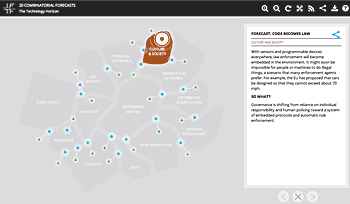Future Now
The IFTF Blog
From #20forecasts: Code Becomes Law
 We are familiar with tactics like firewalls that censor banned websites, whether you are in China or in a Kansas office cubicle. We are also accustomed to—and often frustrated by—DVDs and other media that won’t play on your device because of regional copyright laws. Now imagine a world where these sorts of technological impediments to “illegal” behaviors are embedded in the very fabric of our physical environment. What if your car wouldn’t start before you passed a breathalyzer test? Or could be shut off not by your own On Star system, but by the government? What if your passport determined which laws applied to you, and which didn’t, when travelling abroad?
We are familiar with tactics like firewalls that censor banned websites, whether you are in China or in a Kansas office cubicle. We are also accustomed to—and often frustrated by—DVDs and other media that won’t play on your device because of regional copyright laws. Now imagine a world where these sorts of technological impediments to “illegal” behaviors are embedded in the very fabric of our physical environment. What if your car wouldn’t start before you passed a breathalyzer test? Or could be shut off not by your own On Star system, but by the government? What if your passport determined which laws applied to you, and which didn’t, when travelling abroad?
When the “internet of things,” “smart infrastructure,” and programmable matter combine with a governmentality that prizes security as a core value, then we will see the expansion and increasing reach of embedded governance. We could see laws that can be instantly downloaded into the physical environment, automatic enforcement of existing laws, and “customized” application of certain laws depending on one’s age, status, record, security clearance, licensure, or other factors.
When our world becomes smart and programmable, then code will effectively become law. We will then, as a society, have to come to grips with the values and consequences of our laws, and how much discretion and flexibility we want to “bake in” to our devices and networks. What might lawmaking look like in this future? A collective GitHub for governance? Or totalitarian lock-down? And what might resistance look like?
This post is the second in a series exploring IFTF's new interactive map from our Technology Horizons program, 20 Combinatorial Forecasts—featured in FastCompany Co.EXIST's "When Technologies Combine, Amazing Innovation Happens." Every few weeks we'll take a deep dive into another of the map's twenty forecasts on the future of technology at the intersections of different fields.
Curious about the Technology Horizons program?
- Follow the forecasts at @iftf and #20forecasts
- Find out more about the program
- Check out previous years' Technology Horizons research
- Contact Sean Ness (sness@iftf.org)



